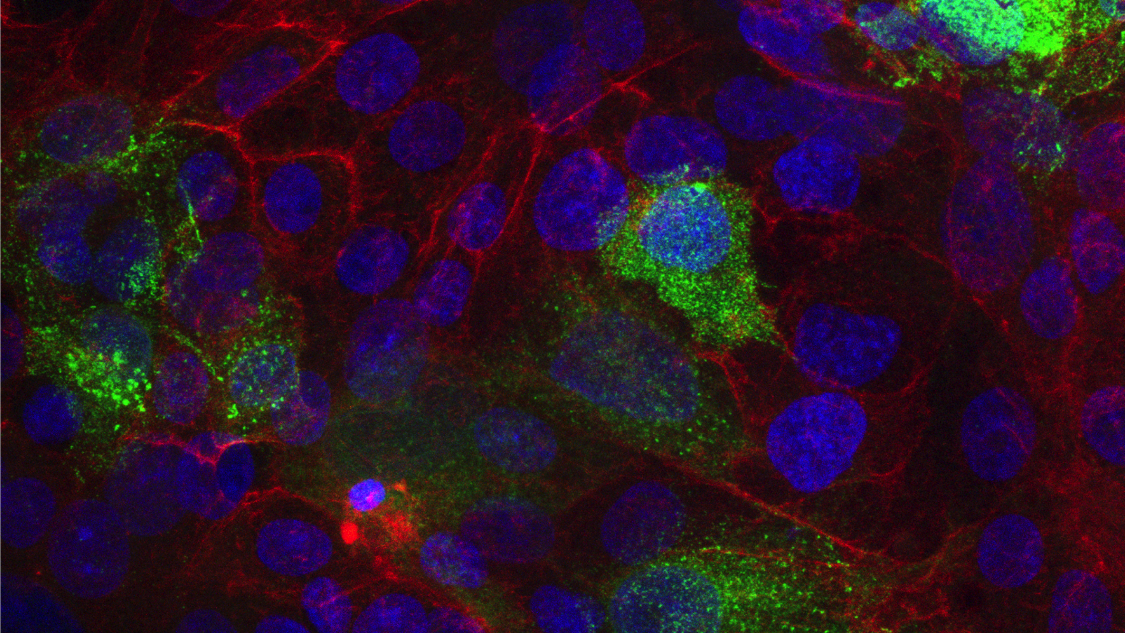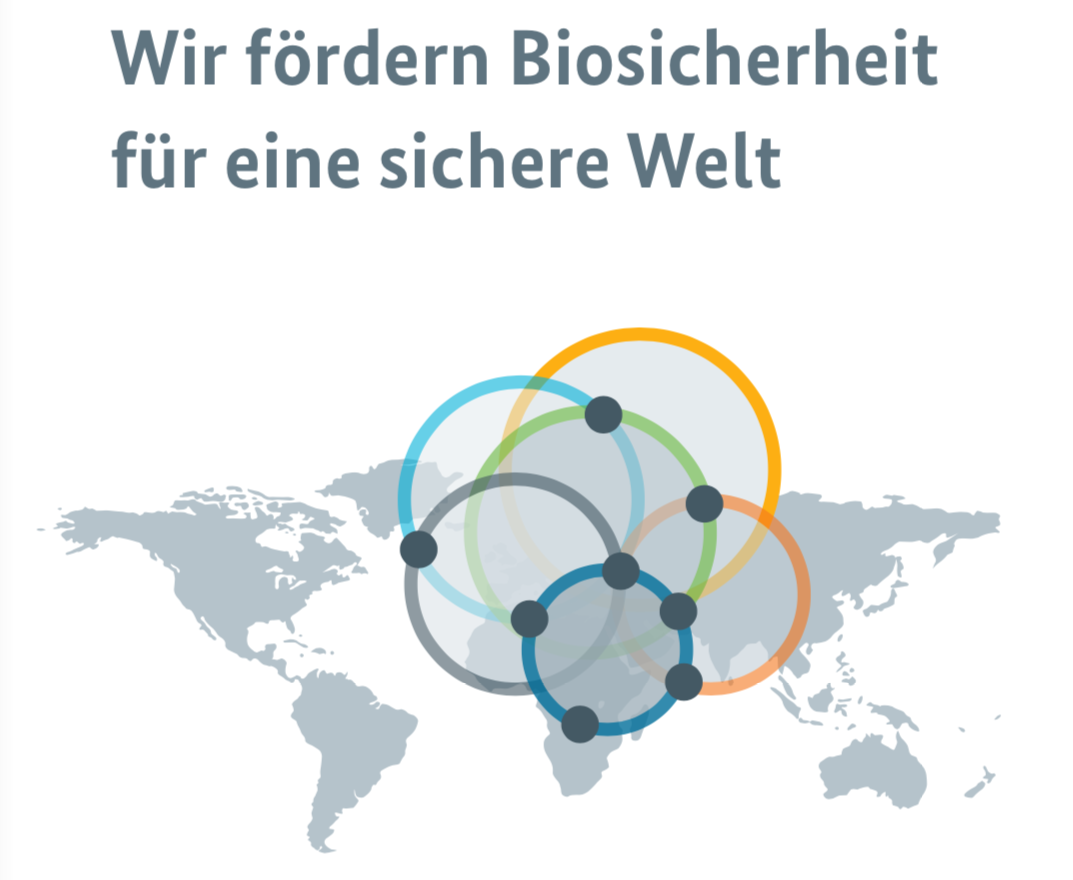Our research projects
Our research focuses on the development and validation of serological test systems. We have many years of expertise in the production of monoclonal antibodies, immunofluorescence preparations and the development of ELISA tests for the detection of tropical and highly pathogenic pathogens and provide serological proficiency testing for laboratory quality assurance
The majority of our projects are part of the German Federal Government's German Biosecurity Programme, which was initiated by the Federal Foreign Office in 2013 in response to the increased risk of terrorist attacks worldwide. Since 2013, a total of 19 countries have been supported as part of this biosafety and biosecurity programme.
All our projects are based on close cooperation and training of laboratory staff by establishing and maintaining modern virological diagnostics for e.g. CCHF- and Hanta-viruses as well as other highly pathogenic, novel pathogens. Scientists and laboratory staff are trained in biosecurity & biosafety in the handling of samples with suspected or PCR-confirmed risk 4 and risk 3 viruses. Another focus is on the cooperation and training of doctors and nurses in hospitals in the handling of infectious material.
Development of serological test systems
We have a large portfolio of monoclonal antibodies against various pathogens, such as Lassa fever, Crimean-Congo haemorrhagic fever, West Nile fever, dengue fever, SARS-CoV-2, Batai, Usutu, Sindbis. We also maintain a reference sample collection with very rare and very well characterised samples, which we use to validate our serological assays.
We work closely with the Diagnostics Development Working Group group here at the BNITM.
Overview of the monoclonal antibodies produced
| Species | Acronym |
|---|---|
| Crimean-Congo haemorrhagic fever virus | CCHFV |
| Lassa virus | LASV |
| Batai virus | BATV |
| Usutu virus | USUV |
| Dengue virus | DENV |
| West Nile fever virus | WNV |
| Sindbis virus | SINV |
| Tuscany fever virus | TOSV |
| Sandfly Fever Naples virus | SFSV (NAP) |
| Sandfly Fever Pappataci virus | SFSV (PAP) |
| SARS-Coronavirus-2 | SARS-CoV-2 |

Projekte im Biosicherheitsprogramm
Gefährliche Krankheitserreger kennen keine geografischen oder politischen Grenzen. Sie kommen in der Natur vor und stellen eine regionale, nationale und internationale Bedrohung dar; das hat die Coronavirus-Pandemie der Welt eindrücklich vor Augen geführt. Deshalb ist die kontinuierliche Forschung an diesen Erregern wichtig. Allerdings ist der sichere Umgang mit Viren und Bakterien der höchsten Sicherheitsstufe sowie Toxinen eine Herausforderung.
On 1 July 2013, the Federal Foreign Office launched the German Biosafety Programme (DEU BioSP) to minimise the risk of these threats for everyone: It brings together specialists from the participating countries, promotes the exchange of information on biosafety, and raises awareness of the responsible handling of dangerous pathogens – in research and in crises. It helps to prevent laboratory accidents and the unintentional release of dangerous pathogens (biosafety) as well as their deliberate misuse (biosecurity). The idea behind the programme is to keep an eye on dangerous pathogens so that they do not become biological risks. The German Biosafety Programme therefore supports the research and monitoring of pathogens and their spread. Through the efficient collection and evaluation of data, disease outbreaks can be detected and combated at an early stage. So that the participating countries can combat disease outbreaks independently, the programme promotes knowledge of how dangerous pathogens can be reliably identified and diagnosed using modern methods and equipment. It also teaches how good communication can work in the event of a crisis. The institutions involved work together to develop and implement guidelines and strategies in the field of biosecurity, strengthen competence centers, establish training-of-trainer formats in which knowledge is passed on independently - and in this way strengthen the partners in a targeted and sustainable manner. The program consists of several individual projects that are being implemented together with the following German institutions:
- Robert Koch Institute
- German Development Cooperation
- Bernhard Nocht Institute for Tropical Medicine
- Friedrich Loeffler Institute for Animal Health
- Bundeswehr Institute of Microbiology




![[Translate to English:] Logo_Alexander_von_Humboldt_Stiftung](/fileadmin/media/Allgemeines_und_Platzhalter/Logo/Logo_Alexander_von_Humboldt_Stiftung.png)
![Logo BMBF [Translate to English:] Logo Bundesministerium fuer Bildung und Forschung](/fileadmin/media/Allgemeines_und_Platzhalter/Logo/Logo_Bundesministerium_fuer_Bildung_und_Forschung.png)
![Logo BMG [Translate to English:] Logo Bundesministerium Fuer Gesundheit](/fileadmin/media/Allgemeines_und_Platzhalter/Logo/Logo_Bundesministerium_Fuer_Gesundheit.png)
![Logo Centre for Structural Systems Biology (CSSB) [Translate to English:] Logo CSSB](/fileadmin/media/Das_Institut/Kooperationen/CSSB_Logo_01.png)
![Logo Deutsche Forschungsgemeinschaft (DFG) [Translate to English:] Logo DFG](/fileadmin/media/Allgemeines_und_Platzhalter/Logo/Logo_DFG.png)
![Logo Deutsches Zentrum für Infektionsforschung (DZIF) [Translate to English:] Logo DZIF](/fileadmin/media/Das_Institut/Kooperationen/Logo_DZIF_01.png)
![[Translate to English:] Logo Emerge](/fileadmin/media/Allgemeines_und_Platzhalter/Logo/Logo_Emerge.png)
![[Translate to English:] Logo European Virus Archive goes global](/fileadmin/media/Allgemeines_und_Platzhalter/Logo/Logo_European_Virus_Archive_goes_global.png)
![Logo Federal Foreign Office [Translate to English:] Logo Federal Foreign Office](/fileadmin/media/Allgemeines_und_Platzhalter/Logo/Logo_Federal_Foreign_Office.png)
![Logo GHPP [Translate to English:] Logo GHP](/fileadmin/media/Allgemeines_und_Platzhalter/Logo/GHPP-Logo-RGB.png)
![[Translate to English:] Logo GPPEBHS](/fileadmin/media/Allgemeines_und_Platzhalter/Logo/Logo_GPPEBHS.png)
![[Translate to English:] Logo iNext](/fileadmin/media/Allgemeines_und_Platzhalter/Logo/Logo_iNext.png)
![Logo Jürgen Manchot Stiftung [Translate to English:] Logo Jürgen Manchot Stiftung](/fileadmin/media/Allgemeines_und_Platzhalter/Logo/Logo_Juergen_Manchot_Stiftung.png)
![Logo LCI [Translate to English:] Logo LCI](/fileadmin/media/Allgemeines_und_Platzhalter/Logo/Logo_LCI.png)
![Logo der Leibniz Gemeinschaft [Translate to English:] Logo Leibniz Gemeinschaft](/fileadmin/media/Das_Institut/Kooperationen/Logo_Leibniz_Gemeinschaft.png)
![[Translate to English:] Logo LFF Hamburg](/fileadmin/media/Allgemeines_und_Platzhalter/Logo/Logo_LFF_Hamburg.jpg)
![[Translate to English:] Logo Pandora](/fileadmin/media/Allgemeines_und_Platzhalter/Logo/Logo_PANDORA.png)
![[Translate to English:] [Translate to English:] Logo der Drugs for Neglected Diseases initiative, bestehend den aus drei orangefarbenen Großbuchstaben DND und einem kleinen i mit schwarzem Punkt.](/fileadmin/media/Allgemeines_und_Platzhalter/Logo/DNDi_Logo_EN_Full_Colour_margins.jpg)





